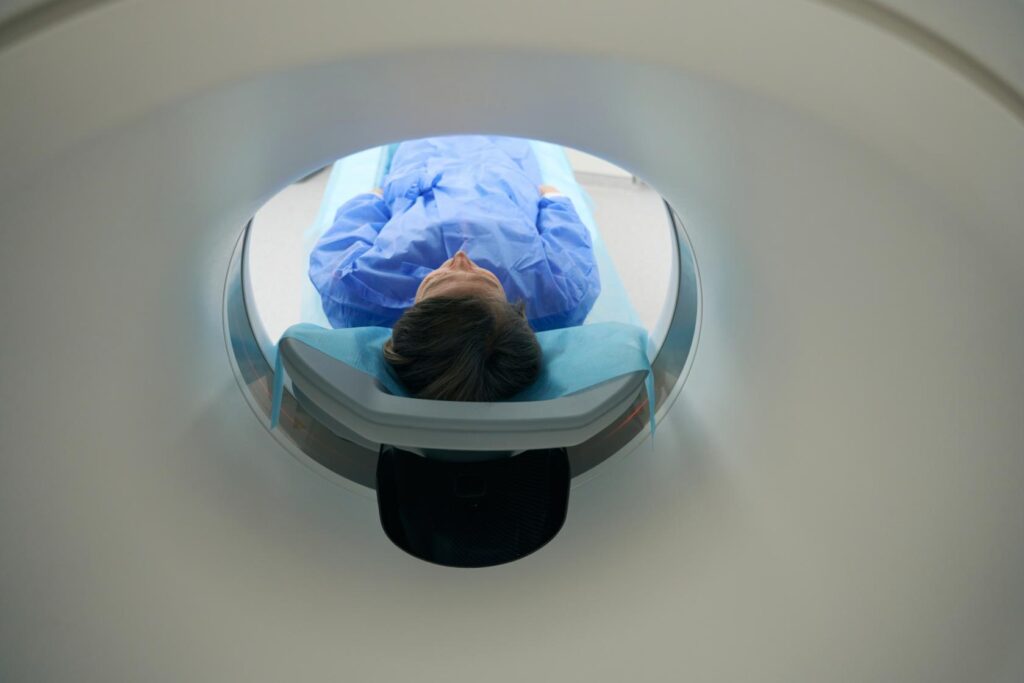Radiation Therapy–Induced Immune Effects:
From Local Treatment to Systemic Anticancer Response
Exploring Abscopal Effects: Combining Radiotherapy with Immunotherapy Opens a New Direction in Integrative Medicine
Free cancer support
What Is the “Abscopal Effect”?
The abscopal effect refers to the phenomenon where local radiotherapy (RT) not only causes shrinkage of tumors at the irradiated site but also leads to regression of distant, non-irradiated tumors. The term was first introduced by radiobiologist Mole in 1953, derived from the Latin ab (away from) and scopus (target) ([Mole, 1953]).
Current evidence indicates that this effect is primarily immune-mediated. Radiation-induced tumor cell death releases tumor-associated antigens and damage-associated molecular patterns (DAMPs) such as HMGB1 and Calreticulin. These molecules activate dendritic cells and CD8⁺ T cells, enabling the immune system to “recognize” and attack distant cancer cells ([Demaria et al., 2004]; [Nabrinsky et al., 2022]).

Mechanisms and Clinical Exploration
1. Radiation-Induced Immune Activation
Traditionally, RT was considered to have only local effects. Modern research, however, demonstrates that RT can trigger immunogenic cell death, releasing signaling molecules that recruit immune cells into the tumor microenvironment, ultimately initiating systemic antitumor immunity ([Nabrinsky et al., 2022]).
2. Combined Immunotherapy Strategies
Studies suggest that combining RT with immune checkpoint inhibitors (ICIs)—such as PD-1, PD-L1, or CTLA-4 inhibitors—facilitates the induction of abscopal effects. Radiation “awakens” the immune system, while ICIs sustain and amplify T-cell activity, creating a synergistic effect ([Rodriguez-Ruiz et al., 2016]; [Fionda et al., 2020]).
3. Clinical Evidence and Challenges
Although rare, abscopal effects have been reported in melanoma, non-small cell lung cancer, hepatocellular carcinoma, and renal cell carcinoma. Evidence indicates that radiation fractionation schedules (hypofractionation vs. conventional), tumor location, and ICI administration timing all influence the likelihood of inducing abscopal effects ([Rodriguez-Ruiz et al., 2016]).
Role of Nutrition and Exercise in Integrative Therapy
1. Nutritional Status and Immune Response
Recent studies show that patients receiving RT combined with immunotherapy who maintain good nutritional status and lower visceral fat ratios experience improved progression-free survival (PFS) and better distant tumor control ([Shirai et al., 2025]).
Recommended strategies include:
- High-protein intake (1.2–1.5 g/kg/day) to preserve muscle mass.
- Anti-inflammatory, antioxidant-rich diet: vegetables, fruits, green tea polyphenols, omega-3 fatty acids.
- Limiting refined sugars, red meat, and saturated fats to reduce chronic inflammation.
2. Exercise and Immune Enhancement
Regular exercise improves cardiopulmonary fitness, enhances immune cell function, and alleviates fatigue. Preclinical and clinical studies indicate that combining aerobic and resistance training with nutritional support improves treatment tolerance, quality of life, and may indirectly increase abscopal effect occurrence ([Minnella et al., 2018]).
Mind-Body Integrative Interventions
Psychological stress and anxiety weaken immune function. Thus, achieving the abscopal effect requires psychosocial support in addition to medical interventions.
- Mindfulness-based stress reduction, meditation, and yoga: reduce anxiety, improve sleep, and modulate immunity ([Greenlee et al., 2017]).
- Music therapy and aromatherapy: help reduce pain and fatigue associated with cancer treatments.
Such interventions serve as supportive strategies to optimize immune responses.
Natural and Complementary Approaches
- Vitamin D: deficiency correlates with poor immunotherapy response; supplementation may be beneficial.
- Curcumin and green tea polyphenols: possess anti-inflammatory and immunomodulatory potential but must be carefully monitored for interactions with RT and immunotherapy ([Hsu et al., 2021]).
- Acupuncture: shows promise in alleviating radiation-related fatigue and supporting immune modulation, though more clinical evidence is needed.
All natural therapies should be supervised by qualified physicians or nutritionists.
Multidisciplinary Care Model
Successful translation of the abscopal effect into clinical practice requires multidisciplinary collaboration:
- Oncologists and radiation oncologists: design RT protocols and determine immunotherapy timing.
- Dietitians: assess nutritional risks and deliver personalized dietary interventions.
- Physical therapists/exercise specialists: develop structured exercise programs.
- Psychologists: provide stress and anxiety management.
This integrated model—medical + nutrition + exercise + psychological—may help transform the abscopal effect from a rare occurrence into a reproducible clinical strategy.
Conclusion
The abscopal effect represents a paradigm shift in oncology: local therapy can be converted into a systemic anticancer response through immune activation. While still rare, combining RT with immunotherapy, supported by nutrition, exercise, and psychosocial care, has the potential to establish this phenomenon as a viable clinical strategy.

Contact our professional team now
References
- Demaria, S., et al. (2004). Immune-mediated inhibition of metastases after treatment with local radiation and CTLA-4 blockade. Clinical Cancer Research, 10(2), 531–539.
- Fionda, B., et al. (2020). Abscopal effect and interventional oncology: state of the art and future perspectives. European Review for Medical and Pharmacological Sciences, 24(2), 773–776.
- Greenlee, H., et al. (2017). Clinical practice guidelines on integrative therapies for breast cancer. Journal of Clinical Oncology, 35(18), 1962–1981.
- Hsu, C. H., et al. (2021). Natural compounds and cancer therapy: Risks and benefits. Frontiers in Pharmacology, 12, 665999.
- Minnella, E. M., et al. (2018). Prehabilitation before surgery: A systematic review. JAMA Surgery, 153(5), 421–429.
- Mole, R. H. (1953). Whole body irradiation—radiobiology or medicine? British Journal of Radiology, 26(305), 234–241.
- Nabrinsky, E., et al. (2022). A review of the abscopal effect in the era of immunotherapy. Cureus, 14(9), e29620.
- Rodriguez-Ruiz, M. E., et al. (2016). Abscopal effects of radiotherapy are enhanced by combined immunostimulatory strategies. Clinical and Translational Oncology, 18(7), 617–622.
- Shirai, K., et al. (2025). Nutritional status and abscopal effect outcomes in cancer patients undergoing radiotherapy plus immunotherapy. BMC Cancer.
